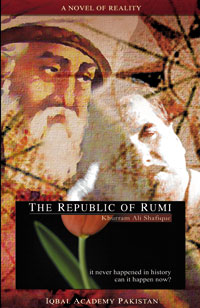A Parable Never Told It never happened in history
Can it happen now? 1 It so happened one day that the Sultan of Turkey came to Jalaluddin Rumi and said, “I banish myself in penance for the sins committed against humanity by the brute force. I leave my kingdom to you.” 2Another Sufi would have declined the offer but Rumi was one in his own league. Spirit and matter had stayed separate for centuries but now that duality came to an abrupt end. 3One of the first things was a whirlwind tour of the country for imparting to the masses an understanding of religion. With the help of parables, poetry, flute and some whirling dance he soon raised the plebeians to such levels of spiritual elevation where they all could vote on matters of religious interpretation. The clergy became very upset and demanded that since it had always represented religion it was now its right to rule. Rumi announced a date on which the entire adult population of the country was to choose between him and the clergy. He won with an overwhelming majority, and his detractors had no option but to leave. Their parting words were, “Democracy is against Islam.” 4Of course, these were the best of the times and also the worst. The crusades had long ended but the European mind was unwilling to burry the dispute. In the Muslim world itself the barbarians were playing havoc—they had started with Afghanistan and did not seem to be stopping even after taking the last caliph of Baghdad alive and then beating him to death. Further towards the East, Hindus and Muslims had been engaged in an armed rivalry for over sixty years. 5Bringing peace to the world was difficult but without using much force, Rumi was able to send barbarians back to their homes, appease the agitated mind of Europe, settle the longstanding dispute over the Holy Land and create trust between Hindus and Muslims. Details are lost but it is related that his peace conferences used to open with a pantomime show of his famous ‘grape fable’: four men who cannot understand each other’s languages are fighting over the choice of fruit they should buy with the coin they have found together; a language expert arrives on the scene, takes the coin and puts grapes in front of the fighting men who then realize that they were, in fact, all pursuing the same choice but naming it in different languages. 6Slavery was intolerable to Rumi. He issued a universal invitation to scientists urging them to come up with an alternate source of energy that should end the need for human slaves. He suggested that replacing the Greek model of research with inductive methods could be helpful. In good time a scientist came from the north of an island beyond the mainland Europe and demonstrated the working of a device that could harness the power of steam to perform varied tasks. Rumi appealed to the world to use this device and free the slaves. The age-old institution of slavery vanished in no time. 7For some time everyone was happy. People from around the world thronged to the court of Rumi and listened to his words of wisdom. Hindus, Zoroastrians, Christians, Jews, pagans and agnostics came for spiritual guidance and returned with a better understanding of the Path according to their own diverse beliefs. 8There was no further trouble until reports started coming that the steam-device was creating problems. Trees were being chopped down mercilessly to feed the fire, skies in some cities were blackened with clouds of smoke and many people were building up large businesses with the intention of throwing smalltime competitors out of the market. 9Rumi addressed the world and explained that in gratitude to God who had given them the power to harness the forces of nature they should voluntarily master the greed in their hearts. Not all the wealth in the world could be sufficient for a heart unless it learns to be content on its own. Yes, you have the freedom to produce as much as your creative faculties desire but will you also find the time to create something in the depths of your soul? “Whoever devours grass ends up under the butcher’s knife,” he said to the world. “Whoever feeds on the light of God becomes the Word of God.” MoralUnfortunately, it never happened in history. Can it happen in the future? Can it happen now? How? Some possible answers to these questions may be hidden in the writings of Dr. Sir Muhammad Iqbal who died in Lahore a year before the beginning of the Second World War. |
 The Republic of Rumi: A Novel of Reality (2007) by Khurram Ali Shafique |
